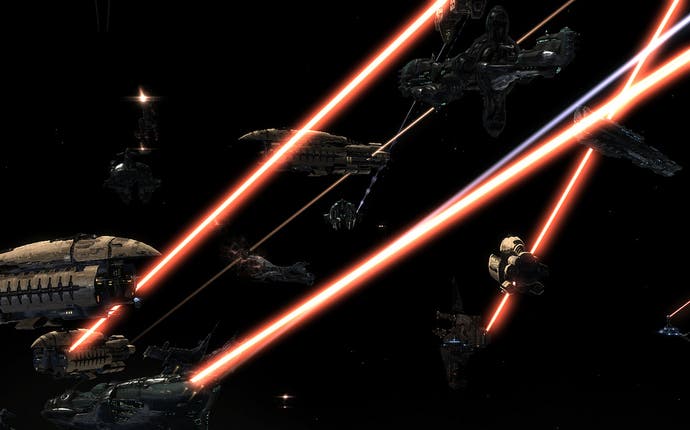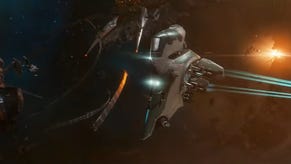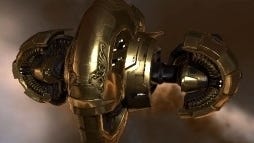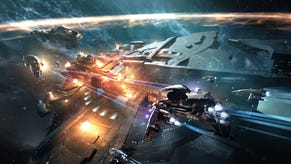EVE Online: Alliance war
The thousands, and the lag
This is the second of a series of articles about the arcane world of player-versus-player combat in EVE Online. The first covered the basics; this month, we look at the large-scale battles that break out between player Alliances.
The flipside to the small gang battles that characterise much of EVE's PVP is fleet warfare. The number of people participating in EVE Online's fleet battles at any one time regularly sits in the neighbourhood of hundreds. Fleet commanders have even adapted their tactics to take into account the lag pauses that such large numbers of players entail - pauses that might last up to twenty minutes. They generally move their ships into position long before the expect to engage, and way before they even expect be able to see what is happening.
To many gamers, even many EVE players, this kind of brokenness in a game seems ludicrous. Why would anyone want to play a game where the fundamental mechanisms don't work as they should? Why would anyone put up with twenty-minute lag? The answer is that there's a much, much bigger picture. It's one that dominates everything in EVE Online.
The reason why so many EVE players want to sink thousands of man hours into laggy, drawn-out fleet combat involving hundreds of ships has less to do with the indulgence of Star Wars fantasies of mass space combat, and far more to do with EVE Online's socio-economic metagame. But what do those big words mean? Well, it's all down to money. EVE players want their virtual currency, and the best way to get a lot of it is to stake out some territory in 0.0 space. To do this, you need friends. Lots of friends.

Originally, claiming territory was worthwhile because you could get the best loot from NPC spawns, or mine the finest space rocks and take away their valuable ores. Then it became a war over the conquerable stations and the outposts - useful deep space service stations where people could operate with impunity. But now that EVE's economy has evolved in complexity, there is a far more valuable resource: the moons.
The war over moons is what is driving many of the immense conflicts that currently take place within the game world. While the political motivations that drove the last great war between The RedSwarm Federation and the Greater BoB Community could be said to have been about showing who was top dog in the EVE universe, many more conflicts have been more financially motivated. There are no better ways to conscript hundreds of players into your lagfest than either dangling the carrot of vast riches in front of them, or pointing out that their easy cashflow could be taken away by your enemies.
While many PVP gangs in the game are just out for a jaunt, blowing up whatever they can, the campaigns waged by the large alliances (which now involve thousands of players at any one time) have a rather more specific target: the Player Owned Structures, or POS, that are anchored at moons. These funny little space towers serve two purposes. One is to hold territory, and the other is to suck valuable resources out of certain moons. Holding territory generally means being able to put your own tower on the moons that are worth megabucks per second, and while you are able to do so, you are getting rich without much further effort. You have to fuel the tower and sell the stuff, of course, but that's far less hassle than mining rocks or blowing up hundreds of NPC ships.

The consequences of POS warfare are huge. And hugeness. The more people you have in your fleet, the more likely you are to win a fight, and this means that any given side will bring as many people as they can to a POS siege. First you need the dreadnoughts to kill the tower, and then you need the battleship fleets to protect the dreadnoughts, and then you need the support ships to protect the battleships, and then you can throw in carriers, titans, and the rest of EVE's vast, complex menagerie of space-toys. Things get bloated pretty fast.
All of which money-motivated mob warfare makes EVE's conflicts seem rather petty and grimy. But in fact the opposite is true. There's a grand sweep to all this that is not present in any other game. Seeing the fleets form up, watching the capital ships jump en masse, seeing the dreadnoughts engage enemy structures - it's got the kind of bombast and enormity that no other game, before or since, online or off, has been able to capture. Not only that, but the logistics, organisation, espionage and counter-espionage, all add up to a game that has more depth than the nine circles of hell. There's no equivalent experience in gaming to that of being caught up in the enormous communal effort of several thousand people trying to defend their slice of the universe, or to take what belongs to someone else.
Furthermore, the machinations and politics inherent in pulling together coalitions of empires that take player numbers into the tens of thousands is a feat that boggles the intellect. Yet it also gives us insight into what MMOs are actually capable of: single worlds in which the actions of gamers affect the game being played by hundreds of thousands of other people. There is nowhere else where this kind of gaming is conceivable, much less possible, and less actually being played out on the servers, night after night. EVE feels more like an event than a game, and even with the lag, even with the absurd, broken game mechanics, there's a sense that so many gamers want to see it, and to be able to say "I was there".









